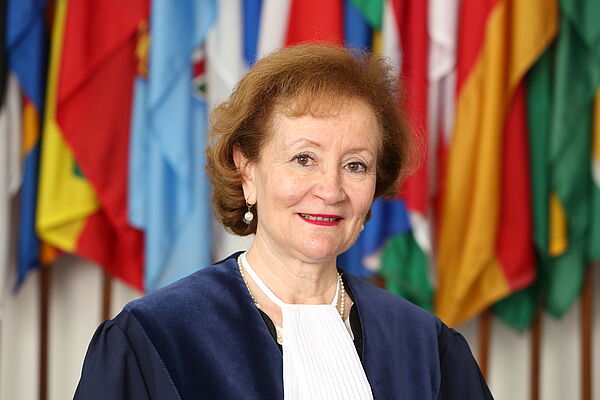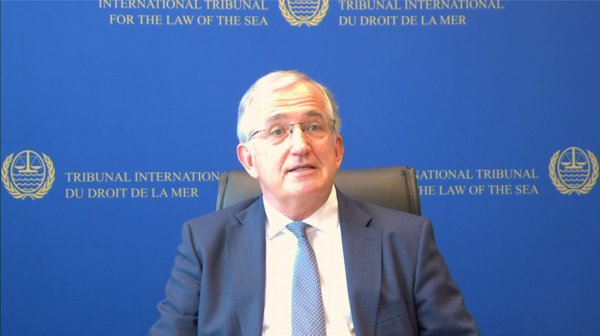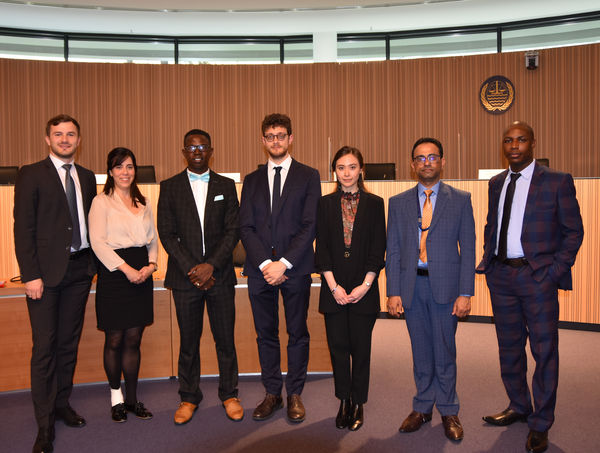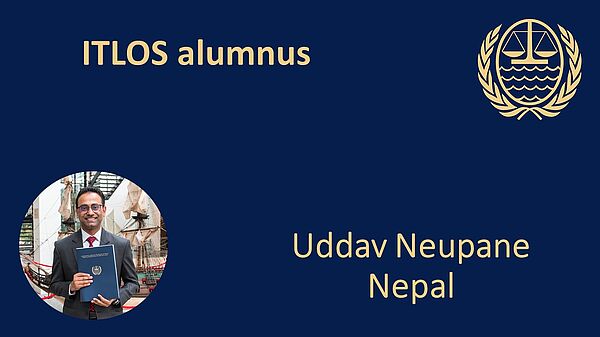Newsletter 2022/1
March 2022
Introduction
It is my pleasure to bring you the Tribunal’s spring newsletter for 2022. It has been written at the close of the Tribunal’s fifty-third session – the first time we have managed to bring all 21 Judges together in Hamburg since March 2020 when the COVID-19 pandemic began.
The Tribunal’s sessions are dedicated to dealing with organizational and administrative matters and to considering legal and judicial developments. During this most recent session, the Judges considered reports prepared by the Registry concerning recent developments in law of the sea matters. They also approved the Tribunal’s Annual Report for 2021 and the Budget Proposals for 2023/2024, which will be submitted to the Meeting of States Parties in June. The Judges also had the opportunity to attend the closing ceremony of the ITLOS-Nippon Foundation capacity-building programme and to hear presentations on the research conducted by the fellows during the programme. I am confident that each of the fellows will return to their respective governments and institutions with an enhanced understanding and ability to advise on the dispute settlement mechanisms under the Convention and we look forward to relaunching the 2022/2023 programme in July. Applications are still welcome.
This year marks the 40th anniversary of the adoption of the Tribunal’s constitutive document, the United Nations Convention on the Law of the Sea. Such an occasion allows all involved in the law of the sea and ocean governance to reflect on the achievements of UNCLOS, and in particular the role played by the Tribunal in the settlement of disputes concerning the interpretation or application of the Convention.
In our current times it is important to recall the fundamental principle of international law requiring States to settle their international disputes peacefully, a principle that also applies in the law of the sea. Indeed, echoing the Charter of the United Nations, Part XV of the Convention establishes a far-reaching compulsory system for the peaceful settlement of disputes concerning the interpretation or application of the Convention. Under this system, States Parties to the Convention are first required to resolve their disputes by any peaceful means of their own choice and, where no such resolution is possible, recourse to international adjudication becomes mandatory, except for some limitations and exceptions. As a central forum for the settlement of disputes under the Part XV system, the Tribunal has made a significant contribution to fulfilling the goals of the Convention with a view to the “strengthening of peace, security, cooperation and friendly relations among all nations in conformity with the principles of justice and equal rights … in accordance with the Purposes and Principles of the United Nations as set forth in the Charter”.
Forty years on, the Convention has done just that, particularly through the work of the Tribunal. Not only has the Tribunal established a consistent track record in assisting States in their endeavours to achieve a peaceful resolution to their disputes over the years, I firmly believe that the Tribunal will also play a crucial role in interpreting and applying the rules of the Convention as and when new legal questions arise. Legal questions surrounding climate change, sea-level rise and the conservation and sustainable use of marine biological diversity in areas beyond national jurisdiction are just some of the examples where the Tribunal may be called upon to facilitate the peaceful settlement of disputes now and into the future.
The diversity and law of the sea expertise of its Judges guarantees that the Tribunal is able to successfully fulfil its mandate. As new ocean challenges emerge, diversity and expertise across gender, culture and the geographical and judicial systems represented on the bench will be crucial in the peaceful settlement of disputes. In this regard, I see the celebration of the first International Day of Women Judges earlier this month as an important acknowledgment of the indispensable role that diversity will always play in the international judiciary.
I hope that you enjoy reading the newsletter.
With my warmest regards,
Albert Hoffmann
President
ITLOS Cases
In accordance with the Order of the President of the Special Chamber of 15 December 2021, the Reply of Mauritius is expected to be submitted in April 2022 and the Rejoinder of the Maldives in August 2022.
Feature article with Judge Infante Caffi (Chile)

Forty years to look forward to the future
The 40th anniversary of the adoption of the United Nations Convention on the Law of the Sea is a timely occasion to reflect on the place and role of Latin American and Caribbean countries in fostering its effectiveness and relevance in the current world. It is appropriate to look beyond nostalgia at the events and the key personalities and officials who made the Convention possible in 1982. In the course of that process, regional participants were not only present but also showed themselves to be fine debaters throughout the discussions while also advancing ideas to build consensus.
The Convention, which was the result of that intensive and comprehensive process of negotiations and compromises, has proven to be a valuable instrument for addressing the changing preferences and interests of States and also for looking at phenomena that connect the law of the sea with a more intersectoral agenda. One important example is the conservation of fishing resources in the high seas and the strengthening of port and flag State jurisdictions in this respect.
On the other hand, the climate change phenomenon and its ramifications for land, the atmosphere and the ocean serve to illustrate the pertinence of considering the interrelatedness of the provisions of the Convention with other juridical and technical instruments. This is a matter of direct concern for Latin American and Caribbean countries that are playing a role in providing better responses, both domestically and internationally, in advancing their own legal and political perspectives. There will also be an opportunity for them to show their capabilities in connection with the concerns raised by autonomous shipping.
These are not new questions but it is now, in our present times, that a number of factors are bringing different perspectives to the role of the Convention. Among those elements, the importance that Latin America and Caribbean States have attached and continue to attach to this instrument must be recognized. Submissions to the Commission on the Limits of the Continental Shelf by a significant number of States are in keeping with this vision.
The Convention is tested by both States Parties and non-parties to ensure that it is able to continue to govern what was agreed 40 years ago and is capable of delivering on matters that are at the core of the international agenda concerning access to and control over natural resources and the environmental framework for activities conducted on the seabed area, on the high seas or in other maritime zones. The Convention plays a critical role in influencing marine policies and in forming a central foundation for negotiations. States are showing awareness that, if meaningful negotiations on issues of common concern are to be conducted, the principles and norms embodied in the Convention constitute an asset that must be preserved. Latin American and Caribbean States share this concern. The establishment of an exclusive economic zone and the delimitation of a continental shelf, which are initiated by claims, coordination and the affirmation of sovereign rights, have become an inherent part of the law of the sea tradition. A common feature of cooperative programmes at regional and subregional levels in Latin America and the Caribbean is their interrelation with global programmes or goals.
In this context, some Latin American States have decided not to adhere to the Convention thus far. Nevertheless, States – in conformity with their respective domestic and constitutional contexts – are not indifferent to the significance of the Convention and the normative value of its institutions where they have been accompanied by customary practices. When these States have discussed the applicability of certain interpretations or the scope of concepts in specific geographical situations, the Convention, as such, has not been called into question. The relevance and the key position that the Convention continues to be called to play in the current process of examining and finalizing the Mining Code for the deep seabed mining regime, in conformity with the principle of the common heritage of humankind, is a matter of particular interest to Latin American and Caribbean States. Confronted with a highly technical, scientific and political agenda, the Convention will be an instrument on the basis of which these States can stand together in reconciling interests and positions, enhancing the relevance of the Convention and the arrangements it embodies. The environmental impact of these activities is part of the overall challenge in the context of the broader picture.
The current BBNJ negotiating process, aimed at adopting a legally binding instrument on the conservation and sustainable use of marine biological diversity of areas beyond national jurisdiction, is another major task undertaken by the international community. These negotiations set a high standard of ambition for Latin American and Caribbean States, which have defined clear goals for marine genetic resources. Questions related to the relationship with other relevant international instruments, as well as the appropriate dispute settlement mechanisms in a future regime, must be addressed through finely-tuned coordination in the region.
Finally, as was set out in resolutions on matters related to the law of the sea adopted by the UN General Assembly in December last year, the concern to ensure that the ocean and seas continue to be a backdrop for current sustainable development and to provide for the needs of future generations is fully shared by Latin American and Caribbean countries.
Conferences

On 29 March 2022, President Hoffmann delivered the keynote speech as part of the conference “UNCLOS at 40: An Assessment”, organized by the Centre for International Law (CIL) at the National University of Singapore. Vice-President Heidar and Judges Jesus, Paik and Kittichaisaree also participated in the two-day programme.
Capacity Building
In June 2022, the Tribunal will be hosting a workshop on “The Role of the International Tribunal for the Law of the Sea in the Settlement of Disputes relating to the Law of the Sea”. The workshop will take place at the International Maritime Law Institute in Malta and will provide government experts working in the maritime field with insights into the procedures for the peaceful settlement of disputes related to the law of the sea, as enshrined in the United Nations Convention on the Law of the Sea, with a particular focus on the jurisdiction of the Tribunal and the procedure for bringing disputes before it.
The inaugural ITLOS Workshop for Legal Advisers (sponsored by the Republic of Korea), organized for the legal advisers of States from South East Asia and the Pacific Small Island Developing States and which was originally planned for late 2021, will now take place in September 2022. The week-long workshop will offer participants a series of lectures and discussion rounds with Judges, academics and practitioners.
ITLOS-Nippon capacity-building and training programme on dispute settlement under UNCLOS

The 15th ITLOS-Nippon capacity-building and training programme on dispute settlement under UNCLOS is drawing to a close. After nearly nine months of intensive lectures and training, the fellows presented the results of their research papers to the Judges in March. Their research topics covered the following subjects:
- “Système de cogestion des ressources halieutiques dans les zones transfrontières: l’expérience des Etats du Golfe de Guinée”;
- “Resolving maritime boundary overlaps beyond the 200 NM limit for the Gambia and coastal neighbours in the Atlantic coast of West Africa”;
- “Nepal’s transit arrangement: International legal perspective”;
- “Flag State responsibility with respect to vessel-source pollution on the high seas”;
- “Deep seabed mining on the continental shelf: Environmental obligations of coastal States”;
- “A dispute settlement mechanism for the BBNJ treaty”;
- “The protection of persons on board fishing vessels through Article 94 UNCLOS”.
The final month of the programme includes visits to the North East Atlantic Fisheries Commission, the OSPAR Secretariat and the International Maritime Organization in London, the Max Planck Institute for Procedural Law in Luxembourg and the European Maritime Safety Agency in Lisbon.
Internship programme

At the start of the year the Tribunal welcomed Hiba Brahmi (Tunisia), Mariana Cretu (Moldova), Gustavo Luz (Brazil) and Manon Rosenthal (France) for internships in the Legal Office. The topics of their research have been, respectively, “The Legal Regime of Offshore Bunkering”, “Marine environmental protection in the seabed mining legal regime”, the “Standard of plausibility in provisional measures prescribed by the International Tribunal for the Law of the Sea” and the “Attribution of Conduct to an International Organization for the Wrongful Acts of a Ship on an International Mission”. We look forward to welcoming our next group of interns to the Tribunal in the coming weeks.
Alumni network
The alumni network series of events continued with presentations by Mubarak Waseem (United Kingdom) on his work as a barrister and member of the London-based Essex Court Chambers and Sebastián Preller-Bórquez (Chile) on “Integrating Sustainable Development into the Adoption of Emergency Orders for the Protection of the Common Heritage of Mankind and the Marine Environment”.
IFLOS Summer Academy
The IFLOS Summer Academy is scheduled to take place from 7 August to 2 September 2022. Further information and the online application form are available on the website of the Foundation.
Meet the ITLOS Alumni

Mr Uddav Neupane (Nepal), Section Officer, Ministry of Foreign Affairs of Nepal, ITLOS-Nippon Fellow 2021/2022 programme
After completing my four-year diplomatic term in the Republic of Korea, I was in the foreign ministry headquarters in Kathmandu looking for an opportunity to engage in research, possibly leading to a PhD. Then came notice through DOALOS of a fellowship opportunity at the Tribunal and after being nominated by my government, I was happy that my application was accepted by ITLOS in 2021. Throughout the nine months of the programme I got to learn a lot about UNCLOS and other international laws and institutions governing ocean affairs, an area of study with which I had had, at least until last year, only minimum interaction.
The law of the sea is important for Nepal, which has been a Party to the UN Convention on the Law of the Sea since 1998. The Convention provides for, among others, the rights of access to and from the sea and freedom of transit for landlocked States. During the fellowship period, I wrote a research paper analysing the transit arrangement of Nepal, looking at the plurilateral organizations of which Nepal is a member and the bilateral treaties it has concluded with transit States and how, in light of the international legal provisions, these arrangements have addressed the transit needs of landlocked Nepal.
Looking back at the programme, I believe that the legal orientation and the research skills I have acquired from this programme will prove a cornerstone in my diplomatic career through their role in making argumentative studies and preparations on issues I am to deal with in the coming years.
Upcoming Events
The workshop on “The Role of the International Tribunal for the Law of the Sea in the Settlement of Disputes relating to the Law of the Sea” will be held on 2 and 3 June 2022 in Malta.
The next IFLOS Summer Academy will be held from 7 August to 2 September 2022.
The ITLOS Workshop for Legal Advisers (sponsored by the Republic of Korea) will be held in September 2022.

